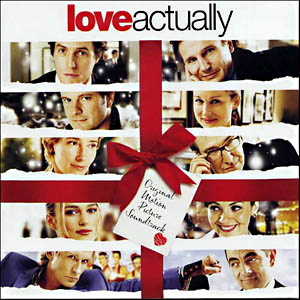Battle Over “Love Actually”
Posted on December 22, 2013 at 8:00 am
“Love Actually” has become a Christmas tradition. The assorted stories of romance, from comic to tender to bittersweet, take place at Christmastime, with a rousing performance of “All I Want for Christmas is You” from Olivia Olson.
My friend Christopher Orr does not like “Love Actually.” He explains why, in great detail, in The Atlantic.
I think it offers up at least three disturbing lessons about love. First, that love is overwhelmingly a product of physical attraction and requires virtually no verbal communication or intellectual/emotional affinity of any kind. Second, that the principal barrier to consummating a relationship is mustering the nerve to say “I love you”—preferably with some grand gesture—and that once you manage that, you’re basically on the fast track to nuptial bliss. And third, that any actual obstacle to romantic fulfillment, however surmountable, is not worth the effort it would require to overcome.
Of course, there are many people who feel differently and it seemed that most of them responded in writing. In Mother Jones, Ben Dreyfuss wrote a piece called “Why ‘Love Actually’ Matters,” noting that he had seen the film at least 40 times. “In ‘Love Actually,’ as in life, people fall in love for crazy reasons…Is the movie a meaningful blueprint on how to meet your life’s love and make it last with them forever? Of course not. But is it romantic? Yes! Romance is the big gesture. Romance is the love that erupts without a spoken word.”
In ThinkProgress, Alyssa Rosenberg wrote:
I like “Love Actually” not because I think it’s a compelling celebration of love, or because it’s a good holiday movie, but because of how sad the film often is…. can be painfully clear-eyed about how difficult it is not to have access to that bounty of affection, and to what are supposed to be happy endings.
Emma Green responded to Orr in The Atlantic as well, calling on C.S. Lewis to back her up:
“Love Actually” shows awkward, charming, complicated entanglements that can be very instructive in thinking about love. To help explain why, I hereby declare my second in this duel: C.S. Lewis. Although a mid-century Christian apologist might seem like an bizarre choice for back-up in a battle about a romantic comedy, his book The Four Loves provides a helpful framework for examining the big question “Love Actually” asks: What is love, actually?
Well, for starters, it’s a lot more than romance. Some of the movie’s most “aww!”-inducing moments do involve big, dramatic declarations of the heart (more on that later), but the most interesting of the movie’s nine or 10 subplots are those that don’t quite fit the expected rom-com mold. That’s because they’re not romantic at all: They’re versions of the first two kinds of love Lewis writes about, affection and friendship.
Orr doesn’t give up. He responded to everyone with a closely-reasoned piece of analysis that could almost serve as a Supreme Court brief or doctoral dissertation.
I think there are two flaws common to many of the defenses of “Love Actually” I’ve seen in comments, on Twitter, and elsewhere on the web. The first is attempting to defend each subplot on an individual basis. I agree that (with one notable exception) any given storyline is perfectly defensible on its own merits. The problem, rather, is the patterns that emerge when you consider the film as a whole. One subplot about an older man wooing a much-younger subordinate? Fine. But three? And on it goes: not one, but two gags (three, if you count the Colin subplot) about how the only possible way a man could overcome heartbreak is with the assistance of one or more supermodels; two storylines in which women (never men) see their romantic lives shattered by obstacles that ought to be surmountable; and, most important, upwards of half a dozen subplots in which characters go directly from initial physical infatuation to (presumed) happily-ever-afters, without remotely bothering to get to know one another in between. These repeated themes are not coincidental.
The second mistake is trying to defend the Keira Knightley storyline, which is flat-out indefensible. Cut it loose, “Love Actually” fans! It’s an anchor that can only bring you down with it.
I “actually” found this debate more entertaining than the movie, which I find problematic but still fun to watch.

